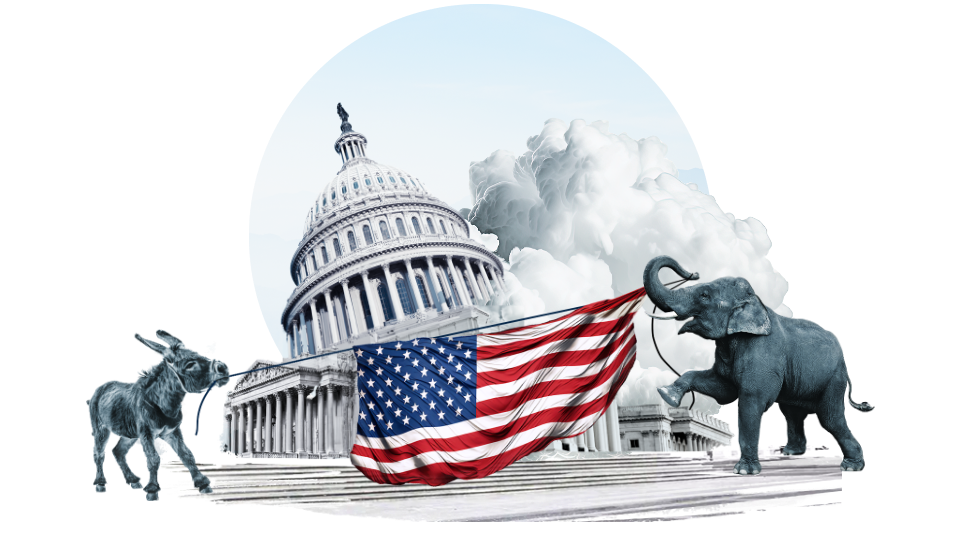26 December
United States: What can we expect in the election year?

On November 5, 2024, the American presidential election will be held. It will undoubtedly be the focus of market attention next year. A new Biden-Trump duel now seems the most likely. The finish line is still a long way off, however, and other scenarios are possible. Above all, even if the Biden-Trump duel were to be replayed, the effects on financial markets could be quite different this time. What can we learn from historical observations of market behaviour in an election year? What consequences might this election have for the US economy? Will stock market volatility rise? Will doubts about the sustainability of US public debt become more pressing?
"It's the economy, stupid"... really?
Almost a year before the presidential election, growth remains dynamic, as of 15 December, the S&P 500 is at a record high, the disinflation movement is well underway, unemployment figures are approaching record lows, the gap between highest and lowest salaries has narrowed and the reindustrialization movement is underway! The Biden Administration's economic record is therefore flattering... especially when compared to the expectations of most observers. Indeed, by the end of 2022, many of them believed that Federal Reserve tightening could only push the US economy into recession... indeed, wasn't that the only way to bring inflation down?
Betting that this record will put Biden in a position to win re-election, however, would be going a bit too far. The feeling of many American households is probably not as favourable as the indicators suggest: while inflation is down, prices are significantly higher than before the pandemic (+25% for food, +20% for new cars and even +35% for used cars). Rising interest rates, for both consumer credit and mortgages, could also have a negative impact on this perception, by weighing on household budgets and home affordability. Finally, in an extremely polarized political context, it is far from certain that this election will be decided on economic and stock market performance alone!
How do markets behave in an election year?
While it is difficult to draw lessons from previous episodes, historical election-year behaviour of the stock market does offer some lessons. Volatility tends to be higher than usual, and stock market performance is generally a little less than ‘normal’. The limitation of these studies is, of course, the small sample size and the fact that severe recessions can significantly affect returns in some election years. However, these studies do reveal several lessons: since 1984, the average election-year performance of equities has been positive, but weaker than in other years.[1] This performance is underpinned by corporate earnings growth, which generally benefits from favourable economic conditions in the run-up to elections, while the risk premium also tends to rise. This increased performance as well as the rise in volatility could be explained by the growing uncertainty surrounding economic policy in election years. From the summer onwards, the "economic policy uncertainty" index tends to rise... falling back only once the results are known.
A constrained fiscal policy
Markets will be attentive to the fiscal choices made by candidates. While the agendas are still unclear, D. Trump has promised to extend "his" tax cuts: decided in 2017, they will expire in 2025. According to CRFB,[2] the cost to the Budget would be some $3.3 trillion over ten years ($3.8 trillion if the increase in interest payments is included). All else equal, this would increase the deficit by more than a full percentage point of GDP and push up public debt to 125% of GDP in 2033, compared with 115% if policy remains unchanged (i.e. if the tax cuts are allowed to expire).
Financing these tax cuts, as announced by former President Trump, with a 10% increase in tariffs on all American imports could, on paper, bring in $2.5 trillion to the Budget over ten years. However, this figure would likely be reduced by a contraction in imports and a fall in growth. Above all, such an increase would set the global economy on the path to a full-scale trade war! Rebalancing the Budget by reducing non-defence discretionary spending, as former President Trump is also proposing, is illusory. Such spending today represents barely 3% of GDP, and cutting it by more than 30% is unrealistic.
Moody's recently reiterated the risks associated with the country's fiscal situation, placing their AAA rating on negative watch. How will bond markets react to the continuing rise in the debt burden and a possible downgrade of the US rating? Investor confidence in the government's ability to manage its debt has steadily eroded over the years: the US CDS has already slipped from 10 basis points in 2021 to over 50 bps at the end of November (earlier in 2023, it was over 70bps by the time of the debt ceiling impasse last spring).[3] Investors will have good reason to tense up again...
Sectoral rather than macroeconomic challenges
With fiscal leeway now more limited, the election will probably be more of a sectoral issue for equity markets, rather than a macroeconomic one. And yet, for markets, the lines drawn by the candidates point in radically opposite directions. J. Biden, for example, has promised a decarbonized electricity sector by 2025 and carbon neutrality by 2050. The previous Trump administration withdrew from the Paris agreement and scrapped several environmental protection laws and regulations. It's a safe bet that this direction will continue if there is a second Trump presidency. Similarly, the future of the ACA (Affordable Care Act) could also be seriously compromised if D. Trump were elected. The candidates' proposals for regulating artificial intelligence could also affect markets. However, the nature of the presidential majority will be just as important as the candidate elected. Either man will be unable as President to keep his promises unless his party wins a majority in Congress.
Monetary policy under pressure...
The question of the independence of the Federal Reserve could also worry the markets. D. Trump has often attacked the central bank, sometimes in violent terms -- in 2019, he called its boss, J. Powell, a "bonehead" -- and tried to appoint Judy Shelton, a fierce critic of the institution and a fervent supporter of a return to the gold standard. Should D. Trump be elected, J. Shelton could well join the Fed (provided, of course, that the Senate does not oppose her again), or even lead the Fed in place of J. Powell, whose term as Chairman expires in January 2026. Going back on central bank independence - or even just hinting at it - even before the memory of the recent inflationary episode has faded, would be dangerous.
Towards rising equity risk premia and volatility...
The programs of D. Trump and J. Biden will thus set the American economy on very different paths. As long as no candidate stands out, it's a safe bet that uncertainty will weigh on equity markets and fuel volatility. While the past isn't always a "good" guide, let's remember that in the 2020 election, Biden did receive 7 million more votes than his opponent, but because of the twists of the US electoral college system, the election came down to less than 100,000 votes, in a handful of states! The worst thing for the markets, of course, would be if the uncertainty were not lifted on November 5, 2024...






